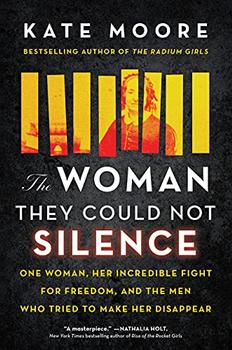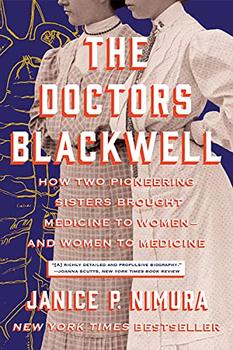Summary | Excerpt | Reviews | Beyond the book | Read-Alikes | Genres & Themes | Author Bio

Sex, Censorship, and Civil Liberties in the Gilded Age
by Amy SohnIf debates over women's reproductive health seem stuck in an earlier era — the fact that birth control pills require a prescription when condoms don't, the furor over Plan B abortifacients being available over the counter, the heartbeat bills challenging Roe v. Wade — it's because they are. American laws and regulations on reproductive health are still heavily influenced by ideas conflating sex education and contraception with pornography, a legacy from the late 19th century. In The Man Who Hated Women, Amy Sohn provides a much-needed retelling of how this came to be via the obsessive New York Postal Inspector Anthony Comstock and the eponymous "Comstock laws" that have cast a shadow over women's reproductive health ever since.
The book's title is hyperbole, but a forgivable instance of it. Comstock worshipped his deceased mother and his silent wife, but he didn't believe women were capable of making their own decisions, and as Sohn shows, he most certainly hated those who defied his narrow worldview. The book begins with Comstock's childhood trauma of losing his mother, and then later as a young man, his horror at the sex trade and pornographic materials prevalent in post-Civil War New York City. Sohn wisely avoids any psychoanalysis of Comstock's obsession with rooting out "vice," interpreted by him as any writings or pictures of sex, sex toys, or, notably, contraception and even information about contraception — all of which he was convinced would corrupt America's youth.
Comstock lobbied to pass ever-stricter laws against the mailing of "obscene" materials, resulting in both federal and state restrictions on the U.S. mail, with Congress passing the landmark Comstock Act in 1873. He focused on the mail because, in his own words, "It is the most powerful agent, to assist this nefarious business, because it goes everywhere and is secret." Like any tech titan today knows, controlling the flow of information can be the key to power.
Sohn recounts the larger-than-life characters Comstock battled, painting a vivid picture of Gilded Age America. There were the activists and questionable grifters Victoria Woodhull and Tennessee Claflin, sisters who spoke and advocated for women's rights including suffrage and sexual equality; Angela and Ezra Heywood, dedicated spouses who promoted free love principles; and Ann Lohman, a New York City abortionist knows as Madame Restell. Comstock pursued and arrested them all, refining his favored technique of sending letters requesting books or pamphlets, and then arresting his targets for mailing the materials.
Somehow, this use of "decoys" was never considered entrapment by the courts, and Sohn misses an opportunity to delve into why this questionable "police work" by someone who wasn't a police officer was legally acceptable at the time by myriad judges and juries. She does, however, capture Comstock's pettiness in hounding his victims for years, and his cruelty — whether it was financially ruining the Heywoods or driving Lohman and multiple other targets to suicide before they could be convicted.
Sohn spends multiple chapters on the fascinating yet tragic story of Ida C. Craddock, who Comstock pursued mercilessly, and whose own mother had her committed to an insane asylum at one point. Craddock did herself no favors by claiming publicly to be married to — and to have an active sexual relationship with — a ghost. But her advocacy for a woman's right to sexual pleasure and equality in marriage was revolutionary, and she held lessons for both male and female students on anatomy and how to have a healthy marital sex life.
Arrested multiple times for mailing her writings on "sexology," Craddock was eventually entrapped by Comstock when he sent a letter posing as an underage girl requesting a pamphlet. Despite rejecting the letter and not sending the pamphlet, Craddock was still arrested on federal charges and became another case of suicide to avoid a Comstock-driven jail sentence.
As the years passed, opinions on sex and contraception began to change in the U.S., and the book's later chapters revolve around activists Emma Goldman and Margaret Sanger, who were pursued and harassed by Comstock but who lived past his death in 1915. They didn't outlive the laws he engendered and both endured prison time, but their activism ultimately paved the way for future legal changes to women's reproductive rights (see Beyond the Book).
These stories of the women and men who advocated for social change and, eventually, sexual liberation are long overdue, but Sohn is right to discuss frankly how many of them espoused scientifically bunk ideas of eugenics. Anti-abortion activists today often use these ideas to impugn everything that women's rights advocates supported, but doing so obscures two things: these activists' rich biographies, and the wide acceptance of these bigoted theories in scientific circles prior to World War II.
By addressing the unscientific nature of these beliefs and the support for them by free lovers and activists like Sanger, Sohn provides the context and nuance to see that while these ideas were mistaken, the activists of the late 19th and early 20th centuries still made crucial strides for women to win the most basic right of all — that of controlling the workings of their own bodies.
![]() This review was originally published in The BookBrowse Review in September 2021, and has been updated for the
August 2022 edition.
Click here to go to this issue.
This review was originally published in The BookBrowse Review in September 2021, and has been updated for the
August 2022 edition.
Click here to go to this issue.

If you liked The Man Who Hated Women, try these:

The Woman They Could Not Silence
by Kate Moore
Published 2022
From the New York Times, USA Today, and Wall Street Journal bestselling author of The Radium Girls comes another dark and dramatic but ultimately uplifting tale of a forgotten woman whose inspirational journey sparked lasting change for women's rights and exposed injustices that still resonate today.

by Janice P. Nimura
Published 2022
Elizabeth Blackwell believed from an early age that she was destined for a mission beyond the scope of "ordinary" womanhood.
Your guide toexceptional books
BookBrowse seeks out and recommends the best in contemporary fiction and nonfiction—books that not only engage and entertain but also deepen our understanding of ourselves and the world around us.